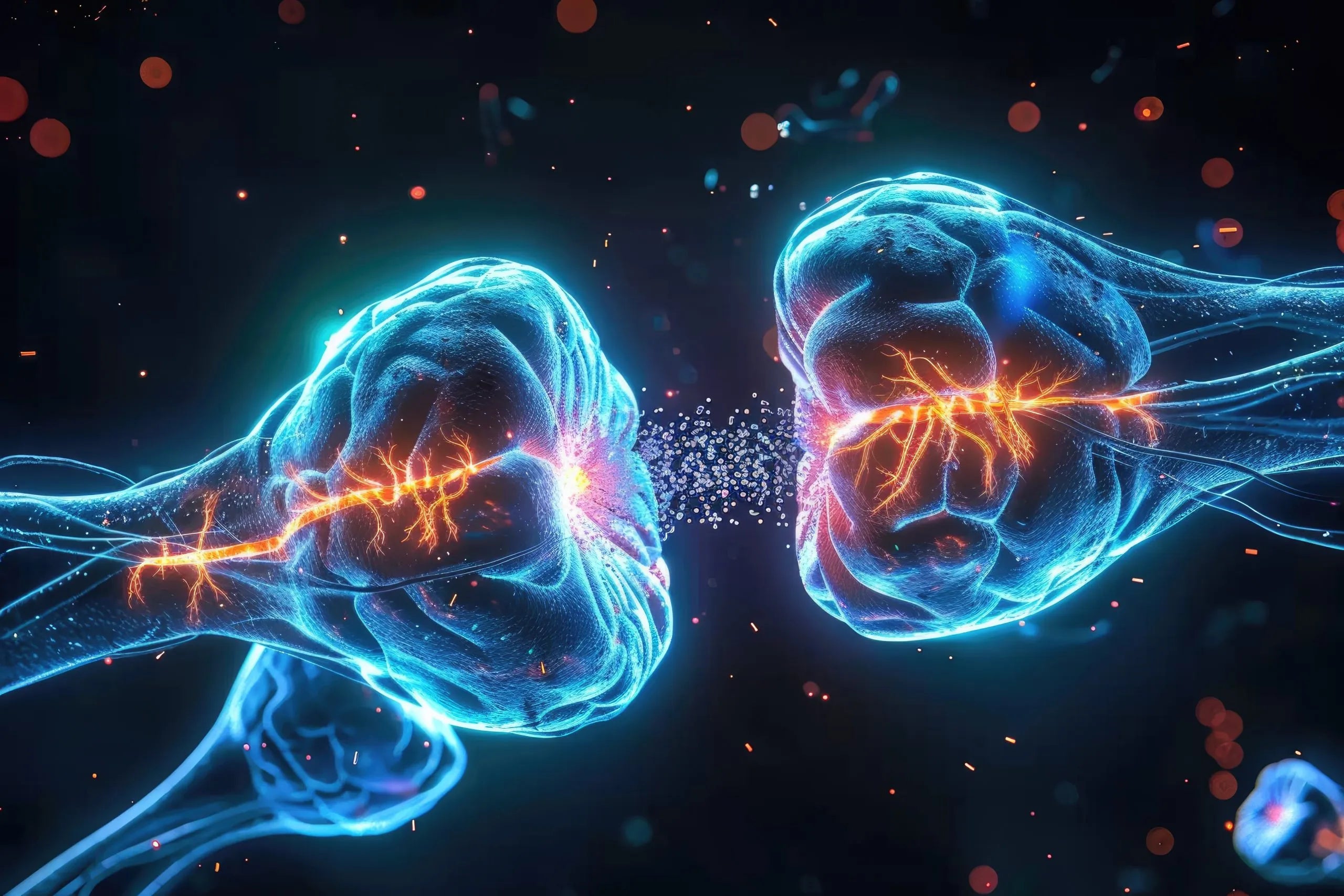Have you ever wondered how your brain sends signals throughout your body? Maybe you've wondered how you experience emotions, learn new information, or how you control your movements?
The answer lies within the fascinating world of neurotransmitters. So, what are neurotransmitters, exactly?
Neurotransmitters are like tiny messengers that carry vital information between neurons. Neurons are specialized nerve cells that send messages through a combination of electrical impulses and chemical signals.
They are essential for communication within the brain and between the brain and the rest of the body, allowing us to think, feel, and act.
What Neurotransmitters Do
Imagine this: You're about to cross the street, and suddenly, a car speeds by. In that split second, your brain gets flooded with signals. First, your senses—sight and sound—pick up the car's movement and engine noise.
This sensory information travels to your brain in the form of electrical signals, moving rapidly along neurons. When the electrical signal reaches the end of a neuron, it can't jump to the next one.
Instead, it triggers the release of what are neurotransmitters into a tiny gap called a synaptic cleft, sometimes simply called the synapse.
The synaptic cleft acts like a bridge between neurons. These neurotransmitters deliver specific receptors to target cells on the neighboring neuron, initiating a new electrical signal. This new signal then carries the message forward.
The human brain contains approximately 86 billion neurons, and each neuron can form thousands of synapses with other neurons. It is estimated that the human brain has around 100 trillion synapses!
Maintaining this vast network of synapses involves an ongoing process called synaptic plasticity (the ability of synapses to strengthen or weaken over time), pruning (the removal of unnecessary synapses), and the repair of damaged connections.
This intricate system of electrical and chemical signaling allows the brain to perform complex tasks such as thinking, memory, learning, and coordinating physical movements.

Types of Neurotransmitters
With over 100 neurotransmitters identified so far, they can be broadly grouped into four major categories: amino acids, monoamines, peptides, and purines.
Amino Acids like glutamate, GABA (Gamma-Aminobutyric Acid), and glycine are primarily involved in fast synaptic transmission.
Glutamate is the main excitatory neurotransmitter in the brain, increasing the likelihood of the receiving neuron "firing" and passing on the signal to a target cell.
GABA is the primary inhibitory neurotransmitter. It acts as a calming influence, reducing the activity of the receiving neuron and bringing balance to your system.
This interplay between excitatory neurotransmitters and inhibitory neurotransmitters regulates overall brain activity. It's important to have a balance for things to function normally.
Monoamineslike dopamine, serotonin, norepinephrine, and epinephrine help regulate mood, arousal, and cognitive functions.
Dopamine plays a key role in reward and motivation, serotonin is crucial for mood and sleep, and norepinephrine is important for attention and arousal.
Peptides like endorphins, substance p, and oxytocin are modulatory neurotransmitters involved in pain perception, stress response, and social behaviors. Endorphins, for instance, are known for their role in pain relief and in producing a feeling of well-being.
Purines like adenosine, and adenosine triphosphate (ATP), play important roles in energy transfer and have neurotransmitter functions in the brain.
Scientists are continuously uncovering the complexity of these chemical messengers.
Key Players: The Magnificent Seven
While many neurotransmitter molecules contribute to our intricate neural symphony, several stand out as key players. What are neurotransmitters?
These are often referred to as the magnificent seven:
- Acetylcholine (ACh): Enables muscle contraction which is important for movement and bodily functions. It's role in memory formation and learning supports cognitive health, highlighting its importance in daily activities and overall well-being.
- Dopamine: Drives motivation and the pursuit of rewards which influence behaviors that lead to goal achievement and satisfaction. It also plays a significant role in regulating mood, scoring big for emotional well-being and mental health.
- Serotonin: Helps regulate mood and contributes to emotional stability and mental health. Additionally, it plays a key role in maintaining healthy sleep patterns and supports digestive processes, making it essential for overall well-being.
- Norepinephrine: Heightens alertness and arousal during stressful situations, enabling quick reactions and decision-making in "fight or flight" scenarios. This response is essential for survival, helping the body prepare for and respond to danger effectively.
- GABA (gamma-aminobutyric acid): Calms neural activity, preventing overstimulation in the brain and promoting relaxation. This inhibitory function is crucial for reducing anxiety, aiding sleep, and maintaining overall mental balance.
- Glutamate: Enhances brain activity and plays a key role in learning and memory formation. Its excitatory function supports cognitive processes, enabling effective thinking, problem-solving, and information retention.
- Endorphins: Act as natural painkillers, helping to alleviate discomfort and stress. Their ability to promote feelings of euphoria and well-being also contributes to a positive mood, making them essential for both physical and emotional resilience. The so-called "runner's high" is a high-endorphin situation.

The Link Between Neurotransmitters and Overall Well-Being
When neurotransmitters are in balance, our brains and bodies function smoothly. However, when there's an imbalance, we may experience challenges. Imbalances can be caused by genetics, lifestyle, or other factors.
For instance, low serotonin levels are linked to mood disorders like depression, while dopamine imbalances are implicated in conditions like Parkinson's disease and addiction.
Understanding, "What are neurotransmitters?" opens the door for interventions and therapies. It's amazing how our bodies use neurotransmitters to communicate within the brain!
Boosting Neurotransmitters Naturally
So, if you are wondering whether you can give your neurotransmitters a little boost—you absolutely can. Here are four ways to support healthy neurotransmitter activity naturally:
1. Move Your Body, Move Your Mood
Research has shown and continues to show that exercise offers remarkable benefits, boosting both dopamine and endorphin levels.
Exercise (in the case of this study, running) has a robust effect on neural plasticity. The results show up quickly and evolve over time. At the beginning it changes neurotransmitters and blood flow.
Then it evolves to additional growth factors in the brain (BDNF, or bone-derived nerve growth factor), and the creation of new neurons in the hippocampus.
No need to necessarily train like an Olympian (though you could try to build up to that, suggested by the study). Just find an activity you enjoy and make it a part of your daily routine. Even going for a short walk can provide benefits.
2. Find Joy in Laughter
Turns out, laughter truly is good medicine, with studies published in the Journal of Neuroscience showing that a hearty laugh can trigger a release of those feel-good endorphins.
Watch a funny movie, share jokes with friends... Laughter is a natural way to give your neurotransmitters a boost and lift your mood.
3. Food for Thought (and happy neurotransmitters)
Certain foods are believed to support neurotransmitter production. Eggs, for example, contain choline, a precursor to acetylcholine.
Foods rich in tyrosine, like cheese, soybeans, beef, lamb, pork, fish, chicken, nuts, eggs, dairy, beans, and whole grain may impact dopamine levels.
It’s worth noting that research on dietary supplements designed to affect neurotransmitters like GABA, have not yielded definitive results, as reported in Frontiers in Psychology.
Prioritize whole foods and a balanced diet as your core strategy for optimal brain health, and consider supplements as an add-on.
4. Prioritize Sleep for a Complementary Neural Reset
During sleep, our brains work tirelessly, clearing out metabolic waste and essentially hitting the "refresh" button. Aim for 7-9 hours of quality sleep each night to allow your neurotransmitters to replenish and your brain to prepare for the day ahead.
A good night's sleep is key to good brain function. Without proper sleep, your mood and energy levels will suffer, you'll live in a brain fog, and you're more likely to have accidents and show poor judgment.

Specific Neurotransmitters
What are neurotransmitters? There are many different types of neurotransmitters in the brain that affect things like mood, sleep, and even muscle movements. Below is a list of specific neurotransmitters and what they do in the body.
Phenylalanine
Phenylalanine is an amino acid that serves as a precursor to several neurotransmitters, including dopamine, norepinephrine, and epinephrine.
Without enough phenylalanine, the body may not be able to produce the right amount of these important neurotransmitters.
Methionine
Methionine, another amino acid, plays a crucial role in various cellular functions and influences neurotransmission. It's important for protein synthesis, metabolism, detoxification, and mineral absorption.
Leucine
As a protein building block, leucine plays a role in muscle protein synthesis, metabolic processes, hormone balance, and indirectly affects the central nervous system.
Glycine
Primarily found in the spinal cord, these inhibitory neurotransmitters regulate motor control and sensory signals. When your brain tells your body to move, glycine is involved in that process.
Tyrosine
Tyrosine acts as a precursor to dopamine, norepinephrine, and epinephrine, playing a key role in the body's stress response. Tyrosine is like phenylalanine and methionine in how it affects neurotransmitters in the body.

Endolyft™ -- Helping You Support Your Neurotransmitters
Our Endolyft™ was formulated by Dr. Charles Gant, a brain researcher who was an M.D. and Ph.D.
The above-mentioned amino acids contribute to very specific classes of neurotransmitters that we need for emotional and mental stability and to decrease anxiety. Gant considered it the side streets and alleyways of the brain, and not the main superhighway.
He called it a neurotransmitter crisis when people went into withdrawal. Essentially, you're taking the chemical away from the addict.
For example, opiates replaced all the endorphins in the brain. The brain literally stops making endorphins because it's getting the endorphins from the opiates.
When you take away the opiates... guess what? Their stores of endorphins are gone. The brain stopped making them when the opiates started.
So now what does the brain do? It'll do whatever it needs to, to replace those endorphins in the brain. Brains do not function well without neurotransmitters. They go into crisis mode.
Gant believed that the solution for people in withdrawal wasn't to put them in a box and wait for them to recover. The solution was to provide the building blocks they need to produce those neurotransmitters again, and rapidly rebuild their endorphins.
People who feel anxious, tired, upset, irritable, and grouchy may also be in that space due to a neurotransmitter crisis. If their brain doesn't have what it needs to function, providing the precursors to those neurotransmitters delivers help fast.
And that's where Endolyft™ can help.
It helps boost the function of all those brain signals from your neurons to various parts of your body and support your brain function as well.
Why not take Endolyft™ for a test drive today?
Conclusion
The question - what are neurotransmitters - might seem like a complex one, and in many ways it is. But it’s this very complexity that allows for the remarkable capabilities of the human brain.
Now that you have an initial understanding how neurotransmitters work and their significance, you can appreciate the symphony of activity happening within your own nervous system every second of the day.

FAQs About What Are Neurotransmitters
FAQ 1: What are neurotransmitters in simple terms?
Imagine your nervous system as a complex network of roads. Neurotransmitters are like the cars that travel along those roads, carrying important messages from one point to another, allowing for communication throughout your body and brain.
Without them, our brains wouldn't be able to communicate with our bodies.
FAQ 2: What are the four major types of neurotransmitters?
While over 100 neurotransmitters have been identified, they can be grouped into four major categories: amino acids, monoamines, peptides, and purines.
FAQ 3: What are 7 key neurotransmitters?
Seven essential neurotransmitters include acetylcholine (muscle function, memory), dopamine (reward, motivation), serotonin (mood, sleep, digestion), norepinephrine (fight or flight, increasing alertness and arousal), GABA (calming), glutamate (learning, memory), and endorphins (natural painkillers that promote feelings of euphoria and well-being).
Each of these has a significant impact on how our brains function.
FAQ 4: How do neurotransmitters affect behavior?
Neurotransmitters have far-reaching effects on our behavior.
For instance, imbalances in serotonin are associated with mood disorders like depression, while dopamine dysregulation can contribute to addiction and neurodegenerative disorders like Parkinson's disease.
Having a neurotransmitter imbalance can have serious effects on your health, whereas good neurotransmitter balance leads to a balanced and happy life.





Share:
What Is NAC? Uncovering Potential Benefits, Uses, and More
Addressing the Doctor Shortage: Key Steps Forward